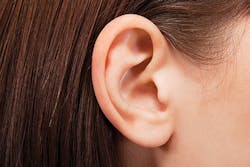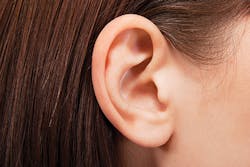Don't lend me this ear!
BY EILEEN MORRISSEY, RDH, MS
You are treating your six-month recare patient with the ultrasonic scaler. He has minimal inflammation and recession, and calculus deposits are moderate. You have scaled the anteriors and are now approaching his lower second and third molars. As you navigate toward the area, he seems uncomfortable. (You sense this through his body language.) You ask him if he is OK? He replies: "Yes, continue."
There is seemingly no reason for sensitivity around Nos. 17 and 18. The patient's hygiene is very good. There is no inflammation or exposed root surface, in contrast to greater recession on the lingual of the lower anteriors. What is going on?
In another scenario, you are treating a three-month periodontal maintenance patient with significant recession in the lower anteriors and generalized interproximal inflammation, again using the ultrasonic scaler. You are able to comfortably treat her "sensitive" areas with no difficulty, but as you scale the buccals of #30 and #31, which have no tissue recession or inflammation, she squirms uncomfortably. You ask her if she would prefer hand scaling in that area, and she is visibly relieved.
-------------------------------------
Other articles by Morrissey
- Little things matter: Give patients a five-star welcome when they arrive
- The Flossing Files
- Let's get this straight!
-------------------------------------
Upon conversing after scaling with both of these patients, I learned that my insert tip caused no discomfort to teeth or tissues. It turns out that it was their sensitive ears. Both experienced abnormal hypersensitivity. My patients described the feeling as: "A knife went into my ear when you touched that tip on my very back lower teeth."
I remember feeling alarmed at the body language they exhibited during treatment, fearful that I was making their teeth uncomfortable. Yet both had assured me it was not the case. It was only at the end of the visit that they divulged their auditory distress. It is as real a problem as dealing with hypersensitivity in the mouth. I knew I needed a solution.
In my 30-plus years of clinical dental hygiene, I have encountered this with only a handful of patients. I realized I needed to be educated. I turned to Dr. Paul Rossos, an ENT physician with New Jersey offices. I asked Dr. Rossos to explain to RDH readers what is causing this hypersensitivity? Why do so few patients seem to be affected? Would disposable earplugs be a solution? Connecting them to their music sources? Is there any risk in unknowingly treating molars with an ultrasonic scaler if they have not informed us - and are "grinning and bearing" their discomfort?
Dr. Rossos's response was enlightening. He explained that the hypersensitivity most likely has nothing whatsoever to do with the noise of the ultrasonic. He provided a brief anatomical review. The condyle of the TMJ impinges on the chorda tympani, a branch of the facial nerve that exits the facial nerve just before it exits via the stylomastoid foramen. In a small percentage of patients, the usage of ultrasonic on mandibular molars creates waves in the tissue that stimulate this nerve, resulting in acute ear hypersensitivity.
While Dr. Rossos did not think this had any correlation to the noise of the unit, he thought it might be an interesting study to try using earplugs on patients who experience this. If nothing else, it might serve as a placebo. He felt that connecting any patient to a music source might (or not) serve only as a distraction. Finally, he did not feel that patients are being placed at excess risk if they are choosing to grin-and-bear ultrasonic scaling and have not informed us of the ear hypersensitivity.
Dr. Rossos treats patients every week who seek him out because different dental treatments have caused them to have ear pain. On a grand scale, he felt that my concern was low on the totem pole because the effects are temporary, not permanent. The symptoms seem to disappear as soon as we stop the use of the ultrasonic, and this is all positive.
So, in the interest of keeping our patients comfortable, what I intend to do in the future is to place an alert tag on the record of patients who have indicated this sort of discomfort (which we unfortunately find out the hard way). I will use the ultrasonic as needed throughout their mouths generally, but will refrain from the use of it in most posterior mandibular regions. Since there does not appear to be any problem in hand scaling the area, this seems to be the most obvious solution. Let's face it; we have some patients that will not allow us to use the ultrasonic anywhere in the mouth, and we accommodate them. Lastly, if any patients are willing, I may just try the earplug remedy to see what happens!
I hope that today's column has provided some enlightenment on content I've not read elsewhere. Onward we go; it is in our hearts' core...! RDH
EILEEN MORRISSEY, RDH, MS, is a practicing clinician, speaker, and writer. She is an adjunct dental hygiene faculty member at Burlington County College. Eileen offers CE forums to doctors, hygienists, and their teams. Reach her at [email protected] or 609-259-8008. Visit her website at www.eileenmorrissey.com.

